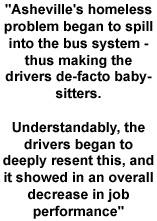
The Asheville Free Fare promotion, which ran for 90 days, ended on November 11. During this time, anyone was able to hop on a bus and take it anywhere within the Asheville public transit system without paying.
Overall, Asheville Free Fare was a success, since many people rode the bus for the first time.
How much of a success has yet to be seen. Will people who rode for free continue to use public transit? Has the experience for the new riders been positive enough so that word of mouth will encourage more frequent use?
While the numbers to answer these questions are being crunched by accountants and experts, I'd like to discuss a problem with the Free Fare promotion that began to manifest itself about six weeks into the promotion:
 Asheville's homeless problem began to spill into the bus system - thus making the drivers de-facto baby-sitters.
Asheville's homeless problem began to spill into the bus system - thus making the drivers de-facto baby-sitters.
At the start of the Free Fare promotion this wasn't much of an issue: If an employee noticed someone spending an inordinate amount of time on the bus, s/he would simply tell that person to get off. Within a few weeks, unfortunately, the homeless population began to learn how to get off and on the buses so that they could spend the entire day jumping from one vehicle to the next.
Understandably, the drivers began to deeply resent this, and it showed in an overall decrease in job performance. (You try getting yelled at by an irate homeless man once a day - and see if that doesn't effect your job satisfaction.)
If a free-fare is to be done again, it should be limited to 30 days. After the 30 days, the drivers should be given a bonus. This would go a long way to solving the morale problems from the influx of new riders.
The fare is now $1 per ride, which should solve the problem somewhat since to a homeless person or drug addict 1 + 1 + 1 + 1 equals a lot of money.
But even with the fare increase there is a deeper lesson here: The problems of homelessness cannot be separated from the desire to run an efficient, accessible public transit system that serves everyone. Otherwise they will hold back whatever you build.
To improve the safety, efficiency and cleanliness of the buses; the homeless need access to mental health care, shelter, drug rehabilitation and jobs that pay a living wage.
This makes the problem of improving public transit look overwhelming. It's like deciding to clean your kitchen, but then finding out you have to re-plumb the entire house first.
The goals of homeless activists, labor unions, heathcare professionals, environmentalists and public transit advocates overlap significantly.
For the explanation behind the Brainshrub Bus Project, click here.
To see all posts for the Brainshrub Bus Project, click here.
2 comments:
Right on. It's a challenge.
"The problems of homelessness cannot be separated from the desire to run an efficient, accessible public"... fill in the blank. nation-state? culture? world?
Post a Comment